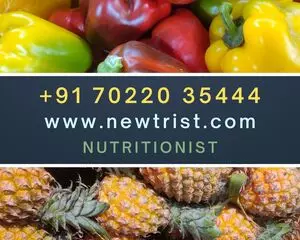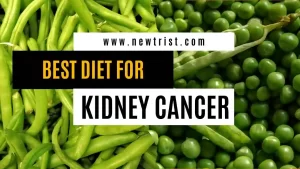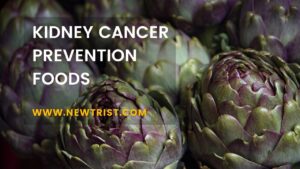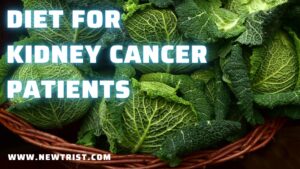The best diet for kidney cancer consists of plenty of high-fiber foods such as fruits, vegetables, whole grains, lean poultry, eggs, and fish to manage the nutrient loss faced due to cancer treatments such as chemotherapy and radiation therapies.
- Early morning drink @ 6:30 am: Ginger drink
- Breakfast @ 9 am: Methi paratha with curd
- Mid-morning meal @ 11 am: Basil-Lime-Pineapple salad
- Lunch @ 1 pm: Capsicum rice + Roti with bhindi sabzi and buttermilk
- Evening snack @ 4 pm: A cup of diced papaya
- Dinner @ 7 pm: Pulka with lauki sabzi and turmeric milk at bedtime
Best Nutritionist in Bangalore
Consult 19-year-experienced Chief Nutritionist Vasanthi, in person at HSR, Koramangala, Bellandur, Haralur, Electronic city, or online across India.

Table of Contents
What is Kidney cancer?
Abnormal proliferation of tumor cells in the kidney tissues causes kidney cancer. Cancer brings changes in the characteristics of a cell which further divides in an uncontrolled manner. These cells find their way to the neighboring tissues and vital organs.
Kidney cancer is more common among males than females between the ages of 65-74. Kidney cancer is rare among children. Wilms tumor affects children which is common in the United States.
Kidney cancer is asymptomatic in its early stages. Once the tumor cells start to proliferate, symptoms may start to appear. Kidney cancer might have started to spread by the time you find noticeable symptoms. Some of the symptoms of kidney cancer include
- Fatigue
- Tiredness
- Low-grade fever
- Backache
- Hypertension
- Blood in the urine
- Lumps in the kidney
- Loss of appetite
- Weight loss
- Pain in the bones.
High blood pressure, obesity, family history, and long-term dialysis treatment in case of kidney failure are some of the risk factors that affect kidney cancer.
What are the types of Kidney Cancer?
The different types of Kidney cancer are
- Renal Cell Carcinoma – Renal cell carcinoma is the most common type of kidney cancer which accounts for 85% of all kidney cancers. Renal cell carcinoma starts to develop as a single tumor in one kidney and gradually spreads to the other kidney. This type is seen in the kidney tubules which carry the nutrients and fluids back to the bloodstream.
- Transitional cell cancer – This type of cell cancer is seen in the renal pelvis where the ureter connects to the kidney. This type of cancer accounts for 6-7% of all kidney cancers.
- Renal Sarcoma – This is the rare form of kidney cancer that accounts for 1% of all kidney cancers. The connective tissues of the kidneys are the most affected areas which carry the risk of spreading to the nearby organs if untreated.
- Wilms tumor – This type of tumor is seen in children which accounts for 5% of all kidney cancers.
Kidney cancer nutrition
Nutritious foods are crucial for kidney cancer patients. A healthy balanced diet is essential to combat the side effects of cancer treatment. Lack of appetite may lead to deficiencies of essential nutrients and cause weight loss. Here is a list of nutritious foods that help to manage good health for kidney cancer patients.
- A healthy diet rich in fruits and vegetables: Fruits and vegetables possess anti-inflammatory properties that fight against chronic inflammation and cancer and provide energy for cancer patients. Apple, pears, guava, papaya, oranges, strawberries, cherries, berries, cauliflower, Kale, and cabbage are some of the fresh sources to be included in the diet.
- Whole grains: Whole grains supply a high amount of fiber, antioxidants, vitamins, and minerals. Whole wheat, oatmeal, quinoa, millet, brown rice, and unprocessed grains are a wise selection of nutritious foods.
- High-calorie foods: Calorie-dense foods are required to maintain a healthy weight. Kidney cancer patients are advised to eat high-calorie foods such as smoothies, curries, gravies, eggs, cheese, and olive oil.
- Appropriate amount of protein: Intake of the appropriate amount of protein is required. Impairment of kidney functions causes difficulty in removing urea and other waste products from the body. Beans, legumes, dairy products, deskinned chicken, eggs, and fish can be consumed in moderate quantities after a kidney replacement.

Kidney cancer prevention foods
Kidney cancer prevention foods are fruits, vegetables, whole grains, dry fruits, beans, legumes, eggs, and lean meats. Healthy food habits and an active lifestyle promote the smooth functioning of the kidneys. Maintaining a healthy weight helps you stay away from obesity which is one of the main causes of kidney cancer.
A diet rich in fiber and low in fat provides numerous benefits for kidney health. Cruciferous vegetables such as cauliflower, cabbage, radish, and brussels sprouts, allium vegetables such as onions and garlic, fruits such as apples, berries, cherries, and grapes, and foods rich in omega-3 fatty acids such as fish, egg whites, and olive oil are excellent sources of healthy foods to be included in the diet to prevent kidney cancer.

Kidney cancer foods to avoid
Kidney cancer foods to avoid are
- Salty foods such as pickles, chips, papads, and sauces
- Red meats and cured meats
- Processed meats such as hot dogs, sausages, and bacon
- Packaged foods
- Fried foods
- Commercially available health drinks
- Popcorn
- Baked goods
- Sweetened fruit juices
- Ice creams and candies.
Kidneys play a vital role in managing the mineral balance and excretion of waste products from the body. It is essential to limit the intake of potassium-rich foods such as bananas, avocados, cantaloupes, oranges, tomatoes, coconut water, spinach, beetroots, potatoes, broccoli, almonds, and cashews. Consume protein-rich foods such as beans, lentils, dairy products, chicken, eggs, and fish in limited quantities.
Foods to fight kidney cancer
Foods to fight kidney cancer are fruits, vegetables, and whole grains with limitations of salt, potassium, and phosphorus in the diet. Fruits and vegetables reduce the chances of recurrence of kidney cancer. Whole grains such as whole wheat, oats, quinoa, brown rice, and millet are rich in fiber and antioxidants that fight kidney cancer.
Consume small meals as the appetite may be low when a person is under treatment. Eat whenever you feel hungry to maintain your body weight. Try swapping smoothies and shakes if a full meal is boresome. Stay away from foods that are either too hot or too cold and acidic foods.

Kidney Cancer FAQs
What foods should I avoid with kidney cancer?
Potassium-rich foods, salty foods, processed foods, preserved meats, refined foods such as polished white rice, bread, pasta, noodles, snacks, beverages with added sugars, sodas, frozen meals, cocoa, oysters, and fast foods should be avoided with kidney cancer.
Consuming too much water should also be avoided as it may cause fluid retention and increase the load on the kidneys.
Can you eat bananas with kidney cancer?
It is advised to stay away from consuming bananas as they are rich sources of potassium and other minerals. However, it is okay if it is consumed occasionally in small quantities. Substitute bananas for other low-potassium fruits like apples, papaya, pomegranates, red grapes, and pears.
Is a ketogenic diet safe for cancer patients?
The ketogenic diet is not considered safe for kidney cancer patients as it is a high-protein diet. cancer affects normal kidney functions. When excess protein is ingested, it puts too much stress on the kidneys to eliminate the waste products from the body.
A ketogenic diet may benefit other types of cancer, but it is not the case with kidney cancer.
What foods kill kidney cancer?
Antioxidant and fiber-rich fruits, vegetables, and whole grains kill kidney cancer. Fruits and vegetables contain a wide variety of vitamins and minerals that benefit kidney health. They are anti-inflammatory that regulates kidney functions.
Shifting to a healthier active lifestyle in addition to dietary changes helps in managing the side effects of kidney cancer.
What is the number 1 cancer-fighting food?
Turmeric, garlic, cinnamon, tomatoes, berries, walnuts, and grapes are the number 1 cancer-fighting foods to include as a part of a healthy diet for cancer patients. Garlic, turmeric, and cinnamon are amazing foods with medicinal properties that possess anti-cancer properties.
Berries contain phytonutrients called anthocyanins that inhibit the development of cancerous cells.